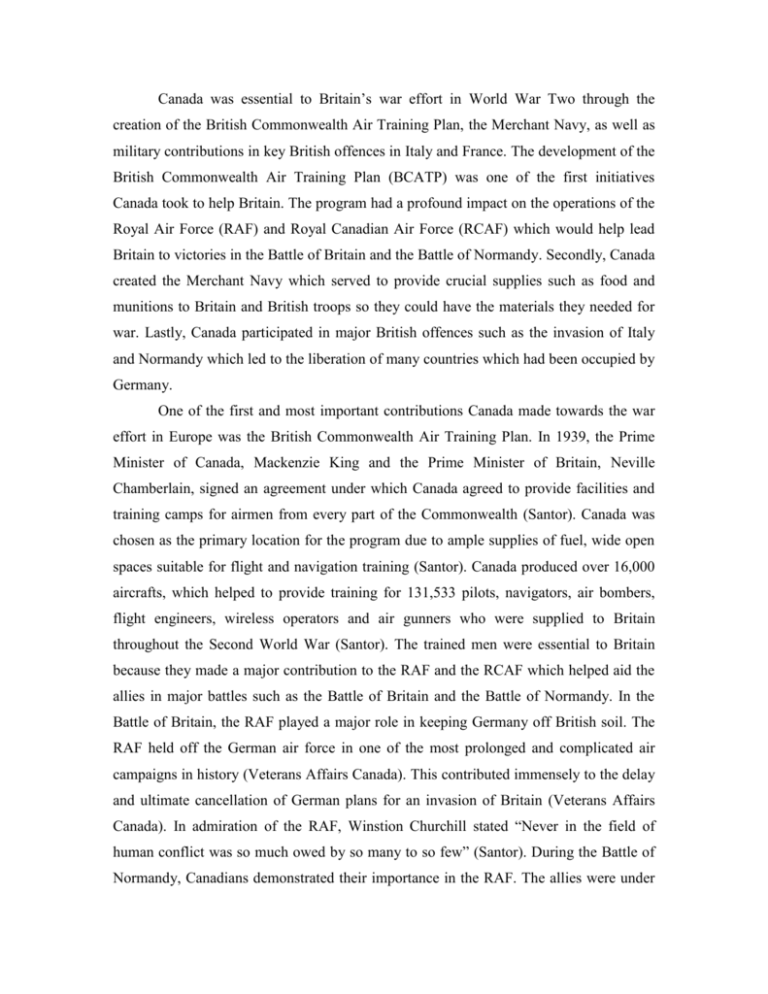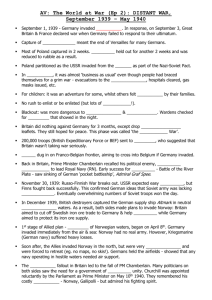One of the first and most important contributions Canada would
advertisement

Canada was essential to Britain’s war effort in World War Two through the creation of the British Commonwealth Air Training Plan, the Merchant Navy, as well as military contributions in key British offences in Italy and France. The development of the British Commonwealth Air Training Plan (BCATP) was one of the first initiatives Canada took to help Britain. The program had a profound impact on the operations of the Royal Air Force (RAF) and Royal Canadian Air Force (RCAF) which would help lead Britain to victories in the Battle of Britain and the Battle of Normandy. Secondly, Canada created the Merchant Navy which served to provide crucial supplies such as food and munitions to Britain and British troops so they could have the materials they needed for war. Lastly, Canada participated in major British offences such as the invasion of Italy and Normandy which led to the liberation of many countries which had been occupied by Germany. One of the first and most important contributions Canada made towards the war effort in Europe was the British Commonwealth Air Training Plan. In 1939, the Prime Minister of Canada, Mackenzie King and the Prime Minister of Britain, Neville Chamberlain, signed an agreement under which Canada agreed to provide facilities and training camps for airmen from every part of the Commonwealth (Santor). Canada was chosen as the primary location for the program due to ample supplies of fuel, wide open spaces suitable for flight and navigation training (Santor). Canada produced over 16,000 aircrafts, which helped to provide training for 131,533 pilots, navigators, air bombers, flight engineers, wireless operators and air gunners who were supplied to Britain throughout the Second World War (Santor). The trained men were essential to Britain because they made a major contribution to the RAF and the RCAF which helped aid the allies in major battles such as the Battle of Britain and the Battle of Normandy. In the Battle of Britain, the RAF played a major role in keeping Germany off British soil. The RAF held off the German air force in one of the most prolonged and complicated air campaigns in history (Veterans Affairs Canada). This contributed immensely to the delay and ultimate cancellation of German plans for an invasion of Britain (Veterans Affairs Canada). In admiration of the RAF, Winstion Churchill stated “Never in the field of human conflict was so much owed by so many to so few” (Santor). During the Battle of Normandy, Canadians demonstrated their importance in the RAF. The allies were under constant and heavy fire from Greman troops and the RAF’s main effort during the battle was a strategic bombing campaign against Germany (Goddard). There were 171 squadrons of fighters and fighter-bombers to blast enemy armour and to shoot at the German airforce if they tried to take the air (Granatstein). The actions of the RAF were critical and without Canada sending “A constant stream of highly trained personnel overseas” the allied victory on the beaches of normandy would not have been possible (Landry). Moreover, the victory led to the liberation of many countries which had been taken over by Nazi Germany (Goddard). Throughout World War Two, the RCAF provided forty-eight squadrons for service in Europe (Santor). This was a major contribution from Canada and it was greatly appreciated by Britain. The overall cost of the BCATP totaled 2.2 billion dollars. Of that cost, Canada paid 1.6 billion dollars despite the fact that the men trained were used specifically for Britain (Nelson). By war’s end, there were 151 training schools across Canada (Granatstein). Canada, in President Roosevelt’s words, was “the aerodrome of democracy” (Santor). The creation of the Canadian Merchant Navy was essential to Britain’s war effort because it provided them with supplies for the war that were necessary for British troops to continue fighting against Germany. Before the war began it was agreed that, “Canada was expected to lead all the dominions in export of arms and materials to the mother country” (Gaffen). To meet this expectation, Canada created the Merchant Navy. The Canadian Merchant Navy was assembled in order to help Britain transport crucial supplies that were needed for war when German submarines tried to cut off their supply routes (Nelson). A single Canadian merchant ship of 10,000 tones could carry enough food supplies to feed over 200,000 people for a week (Gaffen). These merchant ships were able to bring cargo to Britain composed of clothing, fuel, steel, aluminum, lumber, aircrafts, tanks, munitions and guns (Gaffen). The main challenge merchant ships faced were “wolf packs” of German submarines that were scattered throughout the Atlantic surrounding Britain (Veterans Affairs Canada). These submarines would aim for British ships and shoot torpedoes in order to sink them. To avoid this, Canada created the convoy system. Each convoy consisted of between thirty and seventy unarmed merchant ships (Granatstein). The main idea behind the system was for groups of merchant ships to sail together under the protection of warships. Under the convoy system, German submarines could not find an easy and isolated target. Even if they managed to find a convoy, they had difficulty attacking it as it was escorted by antisubmarine ships (Granatstein). The system was very successful. When the war began Canada had thirty-eight merchant vessels and when the war ended 410 merchant ships had been built (Gaffen). A total of 12,000 Canadian brave men and women served in Canada’s Merchant Navy however, there were 1,500 casualties and seventy-two merchant ships were lost (Santor). The Canadian Merchant Navy’s importance as a life line to Britain was vital. Without it, Britain would not have had the supplies it needed to continue fighting and could have potentially fallen under German control. Lastly, Canada was involved in major British offences that helped Britain win the war. One of the first major offences in which Canadian troops participated was the Italian Campaign, an allied invasion of Sicily in 1943. The allied strategy was geared towards capturing Rome and eventually Florence and Northern Italy (Santor). The main goal of the invasion was to overthrow the Italian dictator, Mussolini (Santor). Although Italy surrendered on September 3, 1943, Germany seized control of Italy and the allies were forced to fight the German troops in their advance up the Italian Peninsula (Santor). Despite the fact that Canada had to fight against the most elite and highly trained German soldiers, they managed to defeat them and the allied forces gained control of Italy (Goddard). Canadians were essential in the takeover of Italy and without their help the successful defeat of Nazi Germany in Italy may not have occurred. More then 92,000 brave Canadians fought in Italy and over 26,000 died (Granatstein). In addition, one of Canada’s leading contributions towards the war effort was on June 6, 1944 at D-Day (Goddard). Canada played a major role in the victory on the beaches of Normandy. The plan for D-Day was to land 107,000 men on the first day of the assault and then to draw on more than 1,000,000 men waiting in England (Santor). Canada contributed one infantry division and one armored brigade (Santor). The naval assault on the Normandy beaches was called Neptune (Santor). Detailed and intricate planning was necessary to coordinate the movements of over 4,000 ships which had to clear paths through German defenses and discharge over 100,000 men on a particular beach at a specific time (Santor). Canada supplied over 10,000 men and 110 various types of ships including destroyers, mine-craft and landing ships (Granatstein). Canada’s main role at D-Day was to fight on Juno beach; once again Canada fought against the most elite and highly trained German soldiers. The Canadian troops who fought at Juno possessed determination, courage and self sacrifice which led to the victory in those critical hours. Throughout the battle, 340 Canadians were killed and over 500 men were wounded (Granatstein). “At the end of the day, its forward elements stood deeper into France than those of any other division. The opposition the Canadians faced was stronger than that of any other beach save Omaha. That was an accomplishment in which the whole nation could take considerable pride.” (Juno Beach) Without Canada’s help in World War Two, Britain would have struggled and the outcome of the war could have been drastically different. The BCATP supplied Britain with thousands of trained pilots and other air force personnel which were desperately needed in the air to fight Germany in numerous battles throughout the war. Without Canada training and supplying thousands of men, the RAF would have been seriously impaired. Furthermore, the Merchant Navy that Canada assembled had a profound impact on Britain’s ability to withstand the German onslaught. Without the Merchant Navy serving as its life line, Britain would have suffered and would not have had the supplies they needed in order to fight Germany. Lastly, Without Canada’s participation in countless British offences, Britain would not have had the military support they needed in order to defeat Nazi Germany. Bibliography not available.









